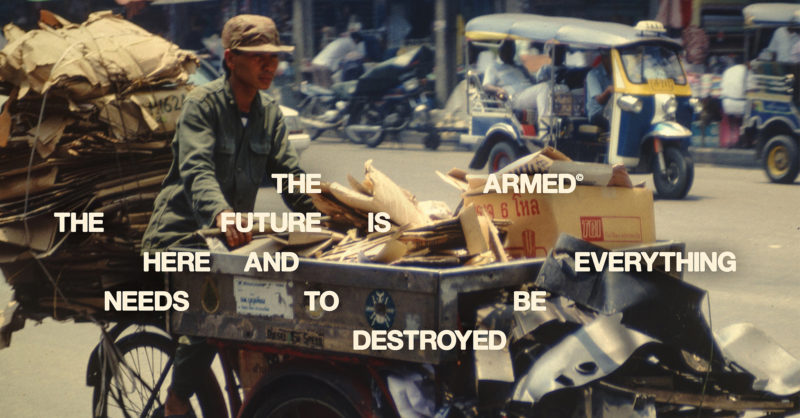Table of Contents
Early Foundations in Punk and Complexity
Basically, The Armed created the sonic character of their debut albums, most notably their 2015 release Untitled. The band was able to extract the robust blend of punk and hardcore genres from this foundational album. Moreover, the instrumentals were sometimes very intricate, with the band’s most well-known tracks also having elements of math-rock and progressive-rock, which contributed to their remarkable complexity level. Consequently, this period defined their initial sonic blueprint.

However, a distinct evolution became evident with their 2021 album Ultrapop and continued prominently on 2023’s Perfect Saviors. During this significant phase, the Detroit-based collective deliberately shifted direction, or at the very least, heavily incorporated noisy pop elements, commonly termed “noisepop.” Simultaneously, they enthusiastically experimented with diverse sonic textures and actively pursued a much more defined and prominent sense of melody within their chaotic framework. This marked a clear departure from their earlier, more abrasive roots.
The Latest Album: Eclectic but Scattered
Now, with their most recent release, The Future Is Here and Everything Needs to Be Destroyed, The Armed reaches their most stylistically diverse point yet. Indeed, the band openly strives for what could be described as a “greatest aspects” project, ambitiously attempting to showcase their full range. Accordingly, the album effectively highlights the group’s impressive multifacetedness, delivering undeniably powerful moments of transcendent rage. Even so, at these altitudes, the compilation as a whole feels somewhat scattered. In the end, it misses out on having a consistent emotional core or a uniting sound, thus giving a fragmented feeling.
Peak Moments and Diminishing Idiosyncrasy
Meanwhile, peak creativity for The Armed arguably occurred within the creative space bridging their 2018 album Only Love and Ultrapop. Much like the peak output of the band Deafheaven during their Sunbather era, this period exuded a distinctive kind of sinister playfulness. Crucially, both bands demonstrated a clear appreciation for beauty within their aggressive soundscapes. However, The Armed consistently approached any sense of musical romanticism with a noticeably greater dose of deliberate mischief and irreverence.
Importantly, traces of this unique idiosyncrasy were still discernible on Perfect Saviors. Perhaps these traces also exist on The Future; however, they seem significantly more diluted and pushed to the background. Unfortunately, the band seems to be excessively preoccupied with the redesigning of their own past creations. As a result of this redesigning, they unintentionally (or maybe on purpose) re-expose their old musical inspirations. Interestingly, they had largely managed to distance themselves from these very same sources by the time Untitled was originally released.
Powerful Yet Chaotic Opening Tracks
Still, one absolutely cannot help but feel an immediate, visceral rush when encountering the opening tracks of The Future. Firstly, “Well Made Play” forcefully combines absolutely mandatory, raw screamage with relentlessly blistering guitar work. Subsequently, a cacophonous yet unnervingly precise instrumental break erupts, recalling the frenetic energy of Black Midi – but specifically, a version of Black Midi that had recklessly consumed a fistful of cheap amphetamines. Following this, “Purity Drag” aggressively assaults the listener, sounding uncannily like numerous 90s punk-leaning tracks (including Nirvana’s famously chaotic “Tourette’s”) violently run through a wood chipper and then haphazardly re-blended within a cold, pharmaceutical mixer. Moreover, the piece functions effectively as both a portrait and a biting caricature of the contemporary narcissist, bluntly declaring “Nothing is my fault” – meaning, it’s always everybody else’s fault! This specific, blame-shifting perspective feels painfully synonymous with the broader cultural climate of the 2020s.
Contrasting Elements on “Kingbreaker”
However, the song “Kingbreaker” employs a clear oscillation between semi-melodic verses and a tortured, intense chorus. While this contrast is certainly effective, it simultaneously feels strangely retrofitted. Therefore, this method appears strangely mismatched with the significantly more tense, divided, and, to be honest, insane world that we live in today.
On another note, the band turns to a refreshed and modernized portrayal of the typical Rage Against the Machine sound on the track “Broken Mirror”. In addition, guest singer Moe Kazra from Prostitute gives such a performance that he seems to want to be Zack de la Rocha’s next-generation counterpart of the well-known style Specifically, Kazra forcefully proclaims the line: “These anti-Christ Christians sure look more like demons.” Indeed, considering our deeply lopsided economy and the intense politicization of Christianity, perhaps this sentiment rings true, and maybe we really should consider tearing the entire system down to start over. But then, a crucial question arises: would our fundamental, underlying human impulses actually operate any differently within a new structure? Ultimately, would we find ourselves arriving at a truly alternate destination, or instead, reach one that pretty much mirrors where we stand right now?
Catchy Momentum in “I Steal What I Want”
Additionally, the song “I Steal What I Want” represents a definite melodic high point within the record. Here, the band successfully forges extremely catchy verses paired with speedy, driving choruses. As a result, they effectively stumble into a specific sonic limbo. Importantly, this particular space was previously time-shared by quasi-hardcore groups from the early 2000s, such as Breaking Benjamin. Nowadays, though, that room is pretty much empty and abandoned. While bands like Soul Glo and Show Me the Body do occasionally stop by purely for a quick shot of nostalgia, The Armed are therefore entirely free to claim this space permanently. Indeed, they can fully move in and decisively make it completely their own.
The track “Local Millionaire” carefully walks the razor-thin edge of a chainsaw blade. Specifically, it balances the raw energy of protest directly against the deep weight of lament. From within this tense, toxic cauldron of sound, a notably hooky guitar solo powerfully erupts.
“Heathen’s” Measured Build
Then, the track “Heathen” deliberately unfolds as the album’s most intentionally paced song. Furthermore, it distinctly launches with a noticeably more subdued atmosphere, even introducing a slightly sultrier ambiance compared to other tracks. Significantly, vocalist Tony Wolski begins by moaning the lines, “On a railing/speeding train.” Immediately, this situation sounds far from promising; instead, it strongly suggests an event that will inevitably escalate. Consequently, this feeling proves accurate as the lyrics soon shift to the much more intense declaration: “Tearing apart / shatter into pieces.” Following this escalation, aggressive blow-torch guitars forcefully enter the mix, while an American anthem-esque guitar solo plays woefully yet powerfully in the background. Ultimately, through this progression, the band masterfully stirs together elements that feel both mundane and extraordinary, blending the cliché with the truly mythic.
Appropriately concluding the entire album, “A More Perfect Design” arrives next as a frenzied, pummeling, and completely off-the-rails noise-fest. Importantly, this closing track features a gasoline-doused, harsh vocal delivery. Consequently, the clear moral delivered by this intense finale seems to be: when reality becomes extremely hard to stomach, the necessary response is to force-feed that harsh reality directly back to the people.
Hardcore’s Long History
It’s really important to take into account the historical perspective: The first album that really influenced hardcore came from Minor Threat in ‘1981’, and then the debut of Bad Brains was just the following year. So, it is not unexpected that the fans of hardcore who nowadays listen to these bands often characterize their music as old-fashioned. Moreover, their pioneering album Jane Doe met the public nearly twenty five years ago! Consequently, the descriptive term “heritage,” which is by no means automatically a criticism, can logically apply to much more than just traditional Americana music genres.

At any rate, throughout this specific album titled The Future, the de facto, recurring themes undeniably center on injustice, raw rage, and acts of sabotage. However, simply exploring these potent subjects does not automatically mean the band presents a fully cogent or detailed manifesto for change.
Furthermore, it sometimes feels like The Armed are actually verging dangerously close to parodying their own intense artistic approach and persona. One of the most prominent features of their inimitable parody is the combination of over-the-top sonic accelerant with old-school, provocative sacrilege. As an instance, they extremely detail the concepts of making crude effigies that represent God and the Statue of Liberty, then they get those two figures, a barren wasteland is the place, and after that they go on setting the whole thing on fire in a very theatrical way.
Finally, this very depiction leads to questioning: what really signifies such an overpowering present time that even these utterly destructive ideas – these “idées d’annihilation” – appear to be, on the one hand, inevitably quaint and, on the other hand, not quite sufficiently shocking when juxtaposed with the current turmoil of the world?



